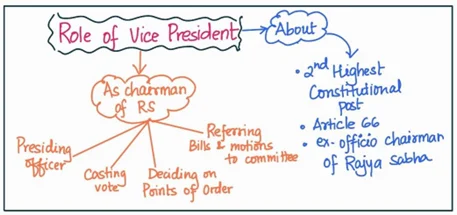Answer:
| Approach:
Introduction
- Begin with a brief overview of the Vice-President’s role as the ex-officio Chairman of the Rajya Sabha and its importance in the functioning of the Upper House of Parliament.
Body
- Discuss the various aspects of the Vice-President’s role as the Chairman of the Rajya Sabha.
Conclusion
- Write a relevant conclusion.
|
Introduction:
The Vice-President of India is the second-highest constitutional office in the country, provisioned under Art.66 of constitution and one of their key responsibilities is to serve as the ex-officio Chairman of the Rajya Sabha, the Upper House of the Parliament of India. This role is crucial to ensuring the smooth functioning of the Rajya Sabha and maintaining the dignity and decorum of the House.

Body:
The role of the Vice-President as the Chairman of the Rajya Sabha are as follows:
- Presiding Officer: The Chairman is responsible for maintaining decorum in the House and has the authority to take disciplinary action against any member who violates the rules or disrupts the proceedings.
- Deciding on Points of Order: The Chairman has the authority to decide on points of order raised by members during the sessions.
- Referring Bills and Motions to Committees: The Chairman plays a crucial role in the legislative process by referring bills, resolutions, and other motions to the appropriate parliamentary committees for detailed examination and report.
- Casting Vote: In case of a tie on any matter being voted upon in the Rajya Sabha, the Chairman has the authority to exercise a casting vote.
- Representing the Rajya Sabha: The Chairman represents the Rajya Sabha in its relations with the President of India, the Lok Sabha (Lower House of Parliament), and other authorities and organizations.
- Referral of Money Bills: While the Rajya Sabha has limited powers in dealing with Money Bills, the Chairman plays an essential role in the process by certifying whether a particular bill is a Money Bill or not, based on the provisions outlined in Article 110 of the Indian Constitution.
Conclusion:
From presiding over sessions to maintaining order and decorum, referring bills to committees, and representing the Rajya Sabha in its relations with other authorities, the Chairman’s role is instrumental in upholding the parliamentary democratic system in India.
